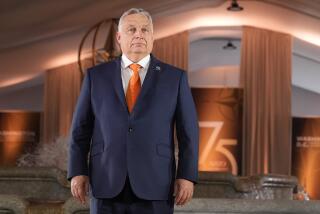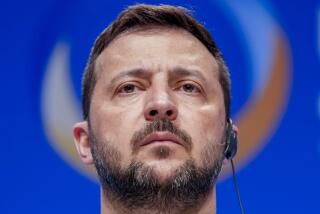Clinton’s Broad Vision Includes All of Europe
- Share via
WASHINGTON — For decades, a line connecting London, Paris, Berlin and Rome defined the circumference of the political and economic Europe with which Washington concerned itself.
But as the North Atlantic Treaty Organization expanded to include an Eastern Europe emerging from the Soviet grip, an underlying theme of the Clinton administration has been to reconstruct the United States’ relations with Europe.
And in one 10-day period, on a journey covering 13,000 miles and touching down in Turkey, Greece, Italy, Bulgaria and, on the final stop Tuesday, Kosovo, President Clinton pushed the envelope further than ever. On that trip, Clinton reached for the point at which the strategic boundaries of Europe would match its geographic boundaries--and, perhaps, beyond.
In Clinton’s view, Europe is more than a place; it is an idea exemplified by democracy and progressive economies.
He presented the outlying, and long-neglected, countries on the eastern and southern edges of Europe as the next territory to be brought into partnership with wealthier neighbors to the west and north.
Along the Aegean and into the troubled Balkans, “further integration into Europe is where the future lies,” Samuel R. “Sandy” Berger, Clinton’s national security advisor, said as the president’s trip neared an end.
Along the way, there were side trips:
As midnight neared Monday in Sofia, the first American president to visit the Bulgarian capital toured the Alexander Nevsky Cathedral, marveling at the icons of the Bulgarian Orthodox Church. In Istanbul, Turkey, he had explored Hagia Sophia, the ancient church turned mosque turned museum.
The purpose may have been nothing more than personal enlightenment. But each tour signaled an interest in a facet of European culture beyond those most commonly associated with the West.
More important, perhaps, there were side issues--and even they fell within the theme of the trip:
In Istanbul, the president witnessed the signing of an agreement drawn up to build a pipeline to carry oil from Baku, the Azerbaijani capital, to Ceyhan, in Turkey. From there, it would be loaded onto tankers for distribution largely in Western Europe.
The pipeline could have gone north into Russia or, less likely, south into Iran. The choice of a route has been a source of tension between Moscow and Washington for several years as each pressured the companies planning to invest in the project.
A secondary pipeline from Central Asia would cut through many of the same lands as the old Silk Road, the route of ancient commerce between Asia and Europe, and in Clinton’s view could have much the same impact, bringing commerce to struggling countries the way a rail line brings business to outlying communities.
But in the case of the pipeline, the impact could reach beyond the economies of the countries of the Caucasus through which it would pass, Clinton argues.
“What happens to these lands on the ancient Silk Road will have an impact on everything from the future of Russia to the security of Europe, to the relationship between the West and the Muslim world, to the strength of the global economy and the continued growth of the American economy,” Clinton said as he took part in the signing ceremony in Istanbul’s Ciragan Palace.
On Wednesday, at the White House, he called the pipeline “a great insurance policy for democracies everywhere.”
Clinton also visited Greece, where the political philosophies that govern the West were born. The administration sees Athens as offering a practical political and economic example for the rest of the emerging southeastern corner of Europe--notwithstanding the violent anti-Clinton demonstrations that greeted the president from a distance.
From a position as one of the weakest economies in the European Union 10 years ago, Greece has become one of the strongest.
“That creates a self-confidence in Greece which enables it both to see itself as a leader of recovery in the Balkans,” Berger said, “and able to engage Turkey in a way that it had not in the past.”
Still, it was in Kosovo, the separatist Serbian province where the Clinton administration last spring engaged in its most difficult overseas mission, that the limits of the president’s effort to bring a new approach to old or ignored relationships were most vivid.
Drawing on a theme familiar to anyone who has heard a presidential speech in recent months, whether at a dinner of gay activists or political supporters back home in Arkansas, the president said in the Kosovo city of Urosevac that the great problems of humanity are driven by the fear of those who are different--and that such fears are without foundation.
So, he said, parents much teach children to turn away from the hatreds that for generations have divided Serbs and ethnic Albanians in Kosovo, Greeks and Turks elsewhere in the region, Protestants and Roman Catholics in Northern Ireland and Israelis and Palestinians in the Middle East.
His message was directed at children like Shpend Hysaj, standing on the floor of a Urosevac gymnasium where he and fellow students had come eagerly to hear the president of the United States. As the man who directed the military campaign last spring that forced Serbian troops from their province, surely Clinton was in as good a position as anyone to deliver a message that would be respected.
Eleven-year-old Shpend--carrying an American flag and sporting wire-frame glasses that give him a serious, scholarly mien--was asked after he had heard Clinton speak whether it would be possible to get along with the Serbs.
Struggling with his English, but not his emotions, he declared, “I don’t think so.”
More to Read
Get the L.A. Times Politics newsletter
Deeply reported insights into legislation, politics and policy from Sacramento, Washington and beyond. In your inbox twice per week.
You may occasionally receive promotional content from the Los Angeles Times.










